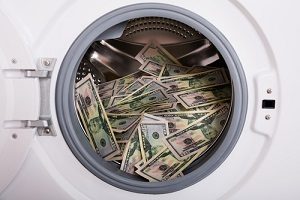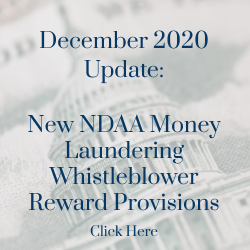Legislation Watch: Proposed Amendments to Bank Secrecy Act Include Whistleblower Rewards

Currently in the 116th Congress, both the House and Senate are considering bills that would amend existing law to provide a whistleblower reporting system and meaningful financial rewards to whistleblowers who come forward to the federal government to report unlawful money laundering and other violations of specified banking laws.
We have previously written on the important benefits that would be available with meaningful anti-money laundering (“AML”) whistleblower rewards.
 These bills, if passed, would provide a new and important avenue for banking whistleblowers, and would provide FinCEN and the Department of the Treasury with a new enforcement tool that has proven effective in numerous other contexts.
These bills, if passed, would provide a new and important avenue for banking whistleblowers, and would provide FinCEN and the Department of the Treasury with a new enforcement tool that has proven effective in numerous other contexts.
What is Money Laundering?
Criminals, from drug dealers to corrupt politicians who have received bribes, want to spend their ill-gotten gains.
Individuals and entities subject to economic sanctions want to make purchases on the global markets. In order to spend their dirty money, these bad actors employ a wide variety of money laundering schemes, sometimes with the assistance of bank insiders.
Banks and law enforcement, in turn, work to detect and prevent such money laundering.
To aid in these efforts, the Bank Secrecy Act and related regulations require U.S. financial institutions to, for example, keep records of cash purchases of negotiable instruments, file reports of cash transactions exceeding $10,000, and report suspicious activity that might signify money laundering, tax evasion, or other criminal activities.
In addition, banks must have compliance programs including “know your customer” practices.
Increasingly, many are using sophisticated data mining and artificial intelligence to sniff out unusual transactions.
Congressional Bills For Money Laundering Whistleblower Programs
Even with law enforcement and compliance efforts, however, money laundering remains difficult to detect.
Congress is now considering amendments to the Bank Secrecy Act that will introduce one tool that has proven effective in many other arenas: financial incentives for whistleblowers to come forward and report wrongdoing.
- H.R. 2514 – The “Coordinating Oversight, Upgrading and Innovating Technology, and Examiner Reform Act of 2019” (the COUNTER Act) was unanimously passed by the House Committee on Financial Services on May 9, 2019, and by Committee Report dated October 21, 2019 was referred to the whole House.
- S. 2563 – The “Improving Laundering Laws and Increasing Comprehensive Information Tracking of Criminal Activity in Shell Holdings Act” (the ILLICIT CASH Act) was introduced in the Senate on September 26, 2019.
Both bills include “whistleblower improvements” that substantially match the whistleblower reward programs for the SEC and CFTC.
The proposed provisions include:
- Establishment of Treasury-based rewards program for those who come forward with significant original information that leads to an enforcement action under the Bank Secrecy Act.
- Whistleblower rewards of up to 30% of monetary sanctions collected in any FinCen BSA enforcement action or related actions if recoveries exceed $1 million.
- Rules to be adopted shall permit whistleblowers to report anonymously if represented by counsel.
- The House, but not the Senate bill, provides that Treasury shall adopt regulations barring retaliation against whistleblowers.
The bills currently have bipartisan support, as well as support from the American Bankers Association and other banking industry groups. The CBO provided a report of the COUNTER Act, forecasting that the proposed amendments in H.R. 2514 would bring in substantial money to the federal treasury, although the CBO’s focus was on tax law and other changes in the bill, and not on recoveries that may result from whistleblower-initiated investigations.
Rewards for Banking Whistleblowers Would Provide Critical Law Enforcement Tool
 Time and again whistleblower reward programs such as the SEC Whistleblower Reward Program, the IRS Whistleblower Reward Program, and the False Claims Act have proven effective in recouping federal damages and collecting penalties for unlawful behavior.
Time and again whistleblower reward programs such as the SEC Whistleblower Reward Program, the IRS Whistleblower Reward Program, and the False Claims Act have proven effective in recouping federal damages and collecting penalties for unlawful behavior.
Money laundering penalties and forfeitures can be substantial, and giving banking whistleblowers a meaningful share in those recoveries would be an enormous step forward.
Examples of recent recoveries in enforcement proceeding that feature money-laundering allegations include:
- UniCredit Bank AG – In April, 2019, the German bank agreed to pay more than $1.3 billion to resolve allegations that it processed hundreds of millions of dollars in financial transactions through U.S. financial institutions for the benefit of entities and individuals subject to U.S. sanctions.
- Standard Chartered Bank – Also in April, 2019, in a settlement with the Department of Treasury and other agencies, the London-based bank agreed to pay $1.1 billion to resolve charges that it processed unlawful transactions with individuals subject to economic sanctions.
- Société Générale S.A. – In November, 2018, the French bank agreed to penalties totaling $1.34 billion to resolve charges that it processed unlawful transactions with individuals subject to economic sanctions.
- Western Union Company – In January, 2017, Western Union entered into a global federal and state settlement forfeiting $586 million and resolving criminal charges that it failed to maintain an effective AML program, and aided and abetted wire fraud.
- Rabobank National Association – In February, 2018, Rabobank pleaded guilty and forfeited $369 million to resolve charges that the bank concealed deficiencies in its AML program and obstructed federal investigation.
- MoneyGram International Inc. – In November, 2018, MoneyGram agreed to pay $125 million to resolve allegations of significant weaknesses in its anti-fraud and AML programs, in violation of prior settlements with the government.
- Banamex USA – In May, 2017, the bank admitted to criminal violations and agreed to forfeit $97.4 million to resolve charges that the bank failed to maintain an effective AML program and failed to file SARs when required.
In addition, a number of high-profile investigations are presumed to be proceeding regarding money laundering schemes related to or involving the Panama Papers, Deutsche Bank, or the Venezuelan government and state-owned entities.
The above list demonstrates how AML schemes overlap with other financial wrongdoing. It is dirty money that needs laundering, and by incentivizing the reporting of money laundering violations, the government will also receive a new tool to detect tax avoidance, sanctions violations, bribery, terrorist financing, and other crimes.
The above list also illustrates the increasingly international scope of money laundering and financial crimes. By offering awards to non-citizens, as other whistleblower reward systems do, U.S. AML enforcement can benefit from information provided by insiders around the world. Last year, for example, international whistleblowers accounted for 12% of the claims submitted to the SEC whistleblower program.
Without the whistleblower provisions set forth in the proposed amendments, financial incentives for AML whistleblowers are meager indeed. While some violations or bad actors may lend themselves to reporting under the SEC Whistleblower Program, the IRS Whistleblower Program, or other laws, AML whistleblowers would benefit far more from the increased certainty and procedural benefits of a program targeted at money laundering violations, particularly if employment protections are included in the final law.
We encourage Congress to move forward on these proposed amendments to the BSA, and hope soon to be adding “Banking Whistleblower” to our list of whistleblower reward programs.
Speak With a Banking Whistleblower Lawyer
Do you believe you have information about money laundering or banking law violations? Contact our money laundering and banking whistleblower attorneys by filling out our secure form to request a confidential consultation.
Read More:
- Financial Fraud
- Tax Fraud
- International Whistleblowers
- Whistleblower FAQs
- The Constantine Cannon Whistleblower Team
- Contact us for a confidential consultation
Tagged in: Financial and Investment Fraud, Financial Institution Fraud, Importance of Whistleblowers, Legislation and Regulation News, Money Laundering,